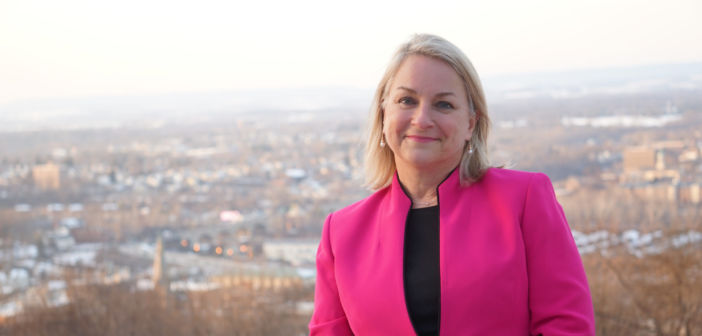Rep. Susan Wild (D-Pa.) is calling for legislative action on student mental health needs on college campuses.
Wild’s proposed bill, Enhancing Mental Health and Suicide Prevention Through Campus Planning Act, would ensure that college campuses are properly equipped to deal with the mental health needs of students.
In a May 5 press release, Wild said she is calling for her bill to be included in any upcoming COVID-19 package because mental health support is critical for the current and long-term health of our communities.
“The evidence-based strategies outlined in my bill will go a long way toward meeting the increasing mental health needs of our nation’s young adults during and after this crisis,” Wild said.
Wild has taken a keen interest in the issue of mental health in the past year and has made addressing it one of her top priorities.
She said among 21 million college and university students in the U.S., three-fifths felt overwhelming anxiety and one-third felt too depressed to function at some point in the last year.
“It was a whole lot of years ago that I was in college, but I still remember some of those feelings,” Wild said.
After reading articles about how a college in Western Pennsylvania completely dropped its mental health program due to lack of funding, Wild discovered there are no federal requirements for mental health resources on college campuses.
“I was reading about this and thinking that these kids don’t really have anywhere to turn during this time,” Wild said. “Mental health issues on college campuses I think have been neglected, as mental health has been in every sector — it just has not been enough of a priority in our country.”
Wild said the bill she proposed would require the Department of Education (DOE) and the Department of Health and Human Servcies (HHS) to work together to help colleges develop and implement comprehensive mental health and suicide plans.
David Rubenstien, executive director of the Health and Wellness Center at Lehigh, agrees college campuses are generally not prepared to handle the mental health needs of their students.
He said over the last seven years across the country, both the volume and acuity of mental health issues has continued to increase significantly, outpacing the resources that are available.
As a result, universities have been struggling to adapt the best practices to address the issue.
Rubenstein found that the most significant mental health issues appearing thematically across the country, including on Lehigh’s campus, have to do with symptoms of depression, anxiety and relationship difficulty.
He thinks Wild’s bill will help bring attention to these issues so they can be properly addressed.
“Universities will have to look at their health and wellness and mental health services and ask themselves if they are meeting acute mental health student needs of their population, and what they need to do to meet those needs in a way that (is) most effective,” Rubenstein said. “I think the bill will force universities to take action and examine their own practices.”
He also said Lehigh’s counseling center is making an independent effort to improve their mental health resources on campus.
The center hired a new psychiatrist for the fall semester and plans to significantly increase outreach about mental health resources on campus to students, staff and faculty. The outreach will also provide staff and faculty with training to help them recognize students in distress, so they can refer the students to the counseling center to get them the help they need early on.
Christopher Carter, associate vice president for government relations at Lehigh, reviews any legislation or mandate that might affect Lehigh.
Carter took interest in the bill and has tried to assist Wild in her efforts.
“I think the congresswoman’s interest and concern about mental health issues is something she’s been very clear and upfront to the public about,” Carter said. “When I read legislation like hers, I think about how we might be able to assist — whether that be giving our thoughts on what we think the impact might be or providing some background to improve the legislation if there are changes that are needed over time.”
In the wake of the coronavirus pandemic, Wild believes the need for mental health resources is going to be more important than ever. In a letter to House Speaker Nancy Pelosi, Senate Majority Leader Mitch McConnell, Senate Minority Leader Kevin McCarthy and Senate Minority Leader Chuck Schumer, Wild wrote of the importance of access to mental health services for students. The letter was co-signed by over a dozen lawmakers.
“As a result of this pandemic, teenagers and young adults face lost social contact, disruption or cancellation of major life events, loss and grief from the death of family members, family disputes, and increased domestic violence. Now is the time for Congress to step up in a bipartisan way to address the mental health needs of college students,” Wild wrote in her letter to congressional leaders. “We believe that if institutions of higher education are better equipped by the federal government with the tools to address the mental health needs of their students, we can mitigate the traumatic stress that college students are experiencing.”
Wild is also aware the lack of clarity surrounding the upcoming semester at Lehigh Valley schools is causing anxiety. While she strongly believes Gov. Tom Wolf has done a good job addressing the health and safety issues for Pennsylvanians, she said she would like to see more industries that can open up in a safe manner do so.
“The hospitals seem to think the standards for Gov. Wolf’s phased reopenings are too strict,” Wild said. “Yes, for the most part, I am with the governor, although I think it’s time to evaluate the phased-in openings and perhaps speed it up a bit.”
Wild introduced her bill before the pandemic, and how it will be implemented on college campuses is still in the works, especially given the uncertainty for the fall semester. Lehigh’s counseling center provided remote services for students after the campus closed in March due to the pandemic.
Wild said she feels it’s incumbent on the federal government to step up and provide the resources necessary, through the DOE and HHS, and have them develop plans.
“The fact of the matter is that college administrators are not mental health professionals, so to just expect them to go create a mental health service that also addresses the issue of suicide prevention is almost silly and a waste of effort,” Witt said.
Although the future remains uncertain for Lehigh right now, according to Carter, serving the needs of Lehigh students, including their mental health needs, is part of the operational planning done for the coming semesters, no matter where students may be located.
In the case that Lehigh Valley colleges do function remotely for the coming fall semester, Wild believes her bill can still work to provide students with needed mental health resources, perhaps even more efficiently.
“I don’t see a reason why [telehealth]wouldn’t work just as well, and possibly even better at a college level, because the demographic is more accustomed to doing things virtually,” Wild said.
As stated in the press release, The Enhancing Mental Health and Suicide Prevention on College Campuses Act is endorsed by nine organizations including the American Psychological Association, the American Foundation for Suicide Prevention, the Jed Foundation and the Trevor Project.






Comment policy
Comments posted to The Brown and White website are reviewed by a moderator before being approved. Incendiary speech or harassing language, including comments targeted at individuals, may be deemed unacceptable and not published. Spam and other soliciting will also be declined.
The Brown and White also reserves the right to not publish entirely anonymous comments.
4 Comments
Why is it the federal governmen’s responsibility to fund college mental health centers?
Typical democrat response is to use my tax money to fund their pet projects. We survived in much tougher times thru college by putting on our big boy pants.
Wilde is pandering for votes with giveaway money.
This is a great initiative. There are so many students who are affected by the pandemic. Most of them depend on their parents or their own pocket money for their livelihood. It is locked down entirely or partially, and students will feel hesitant to approach a clinic as the virus is spreading throughout.
Thank you for sharing this blog !!!
This was a very good decision taken for the student’s well-being. You are doing a great work. Congratulations to you and your whole team.